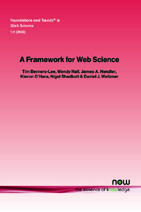A Framework for Web Science
By Tim Berners-Lee, Computer Science and Artificial Intelligence Laboratory, Massachusetts Institute of Technology | Wendy Hall, School of Electronics and Computer Science, University of Southampton | James A. Hendler, Department of Computer Science, Rensselaer Polytechnic Institute | Kieron O'Hara, School of Electronics and Computer Science, University of Southampton | Nigel Shadbolt, School of Electronics and Computer Science, University of Southampton | Daniel J. Weitzner, Computer Science and Artificial Intelligence Laboratory, Massachusetts Institute of Technology
Abstract
This text sets out a series of approaches to the analysis and synthesis of the World Wide Web, and other web-like information structures. A comprehensive set of research questions is outlined, together with a sub-disciplinary breakdown, emphasising the multi-faceted nature of the Web, and the multi-disciplinary nature of its study and development. These questions and approaches together set out an agenda for Web Science, the science of decentralised information systems. Web Science is required both as a way to understand the Web, and as a way to focus its development on key communicational and representational requirements. The text surveys central engineering issues, such as the development of the Semantic Web, Web services and P2P. Analytic approaches to discover the Web's topology, or its graph-like structures, are examined. Finally, the Web as a technology is essentially socially embedded; therefore various issues and requirements for Web use and governance are also reviewed.
A Framework for Web Science
A Framework for Web Science sets out a series of approaches to the analysis and synthesis of the World Wide Web, and other web-like information structures. A comprehensive set of research questions is outlined, together with a sub-disciplinary breakdown, emphasising the multi-faceted nature of the Web, and the multi-disciplinary nature of its study and development. These questions and approaches together set out an agenda for Web Science, the science of decentralised information systems. Web Science is required both as a way to understand the Web, and as a way to focus its development on key communicational and representational requirements. A Framework for Web Science surveys central engineering issues, such as the development of the Semantic Web, Web services and P2P. Analytic approaches to discover the Web's topology, or its graph-like structures, are examined. Finally, the Web as a technology is essentially socially embedded; therefore various issues and requirements for Web use and governance are also reviewed. A Framework for Web Science is aimed primarily at researchers and developers in the area of Web-based knowledge management and information retrieval. It will also be an invaluable reference for students in computer science at the postgraduate level, academics and industrial practitioners.
